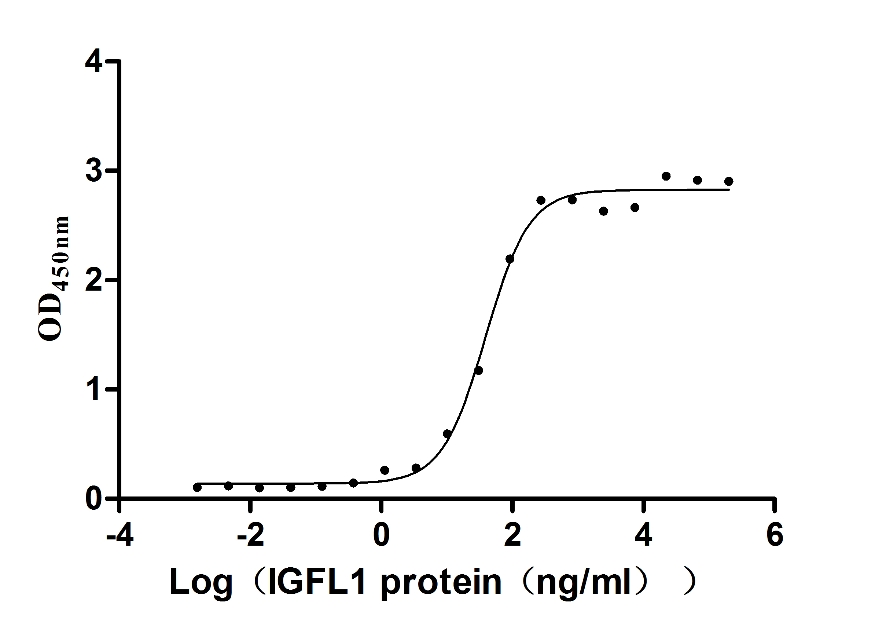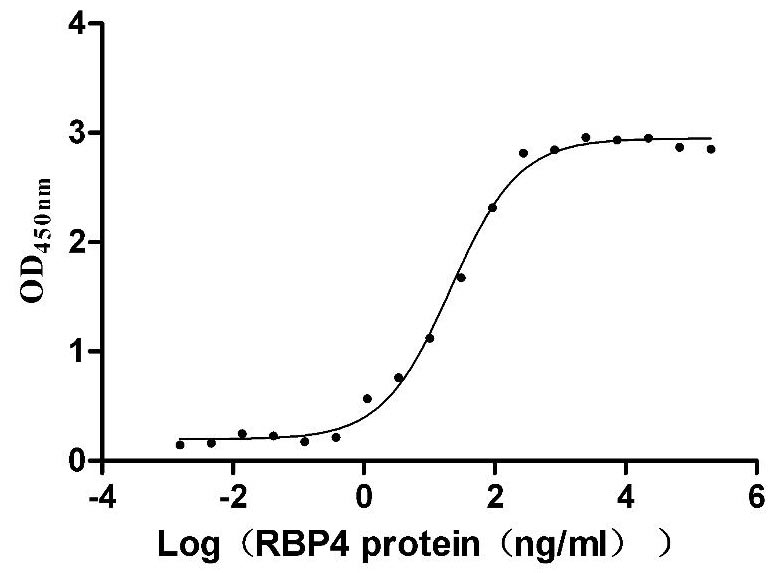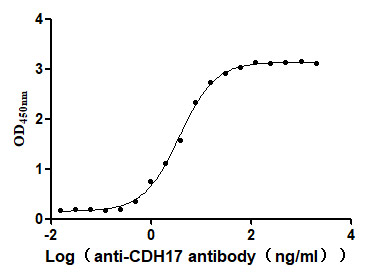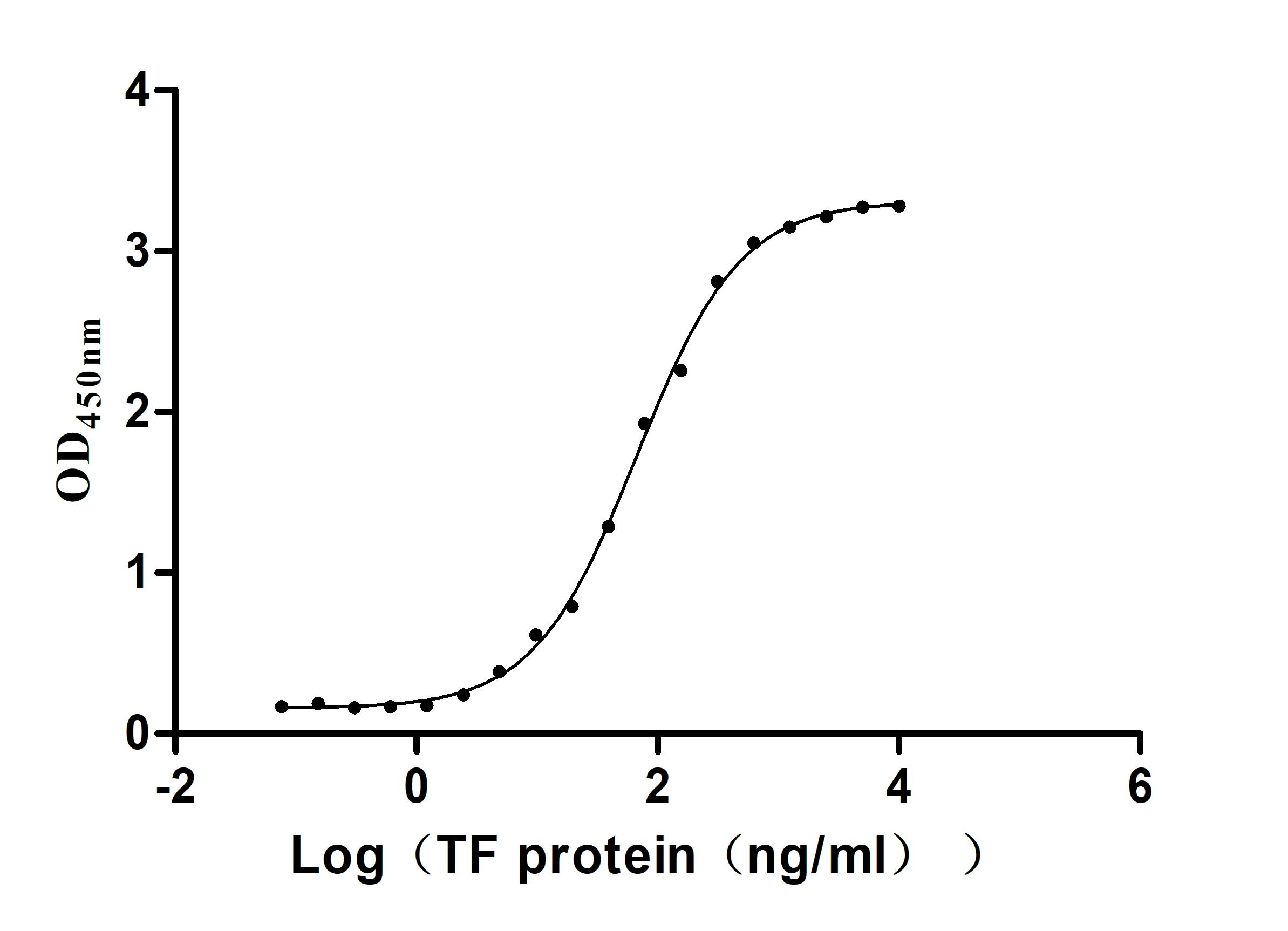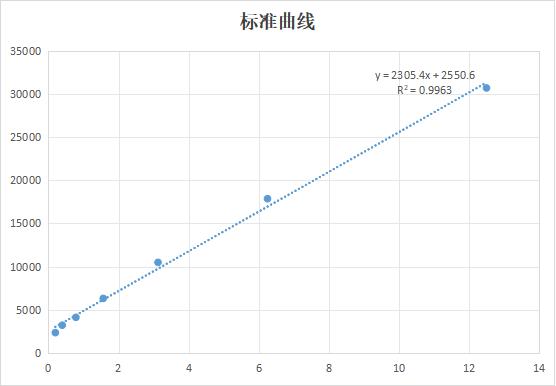Recombinant Human Gastrokine-1 (GKN1)
-
货号:CSB-YP868309HU
-
规格:
-
来源:Yeast
-
其他:
-
货号:CSB-EP868309HU-B
-
规格:
-
来源:E.coli
-
共轭:Avi-tag Biotinylated
E. coli biotin ligase (BirA) is highly specific in covalently attaching biotin to the 15 amino acid AviTag peptide. This recombinant protein was biotinylated in vivo by AviTag-BirA technology, which method is BriA catalyzes amide linkage between the biotin and the specific lysine of the AviTag.
-
其他:
-
货号:CSB-BP868309HU
-
规格:
-
来源:Baculovirus
-
其他:
-
货号:CSB-MP868309HU
-
规格:
-
来源:Mammalian cell
-
其他:
产品详情
-
纯度:>85% (SDS-PAGE)
-
基因名:GKN1
-
Uniprot No.:
-
别名:18 kDa antrum mucosa protein; AMP 18; AMP-18; AMP18; Antrum mucosa protein, 18-KD; BRICD 1; BRICD1; BRICHOS domain containing 1; CA 11; CA11; CA11 gene; CA11 protein; FOV; Foveolin; Gastrokine-1; Gastrokine1; GKN 1; Gkn1; GKN1_HUMAN; MGC70354; Protein CA11; UNQ489/PRO1005
-
种属:Homo sapiens (Human)
-
蛋白长度:Full Length of Mature Protein
-
表达区域:35-199
-
氨基酸序列NYNINV NDDNNNAGSG QQSVSVNNEH NVANVDNNNG WDSWNSIWDY GNGFAATRLF QKKTCIVHKM NKEVMPSIQS LDALVKEKKL QGKGPGGPPP KGLMYSVNPN KVDDLSKFGK NIANMCRGIP TYMAEEMQEA SLFFYSGTCY TTSVLWIVDI SFCGDTVEN
-
蛋白标签:Tag type will be determined during the manufacturing process.
The tag type will be determined during production process. If you have specified tag type, please tell us and we will develop the specified tag preferentially. -
产品提供形式:Lyophilized powder
Note: We will preferentially ship the format that we have in stock, however, if you have any special requirement for the format, please remark your requirement when placing the order, we will prepare according to your demand. -
复溶:We recommend that this vial be briefly centrifuged prior to opening to bring the contents to the bottom. Please reconstitute protein in deionized sterile water to a concentration of 0.1-1.0 mg/mL.We recommend to add 5-50% of glycerol (final concentration) and aliquot for long-term storage at -20℃/-80℃. Our default final concentration of glycerol is 50%. Customers could use it as reference.
-
储存条件:Store at -20°C/-80°C upon receipt, aliquoting is necessary for mutiple use. Avoid repeated freeze-thaw cycles.
-
保质期:The shelf life is related to many factors, storage state, buffer ingredients, storage temperature and the stability of the protein itself.
Generally, the shelf life of liquid form is 6 months at -20°C/-80°C. The shelf life of lyophilized form is 12 months at -20°C/-80°C. -
货期:Delivery time may differ from different purchasing way or location, please kindly consult your local distributors for specific delivery time.Note: All of our proteins are default shipped with normal blue ice packs, if you request to ship with dry ice, please communicate with us in advance and extra fees will be charged.
-
注意事项:Repeated freezing and thawing is not recommended. Store working aliquots at 4°C for up to one week.
-
Datasheet :Please contact us to get it.
相关产品
靶点详情
-
功能:Has mitogenic activity and may be involved in maintaining the integrity of the gastric mucosal epithelium.
-
基因功能参考文献:
- Data show that ubiquitin protein ligase E3 component n-recognin 5 protein (UBR5) bound the tumor suppressor gastrokine 1 (GKN1) and increased its ubiquitination to reduce the protein stability of GKN1. PMID: 27590582
- These results did not confirm GKN1 as a potential biomarker for gastric cancer. PMID: 27452910
- Low GKN1 expression is associated with gastric cancer. PMID: 27250838
- GKN1 may contribute to the maintenance of gastric epithelial homeostasis and inhibit gastric carcinogenesis by down-regulating the gastrin-cholecystokinin B receptor signaling pathway. PMID: 25752269
- Gastrokine 1 indirectly participates in actin stabilization since its overexpression in gastric cancer cells strongly increases the expression of tight and adherens junction proteins PMID: 26008777
- AMP-18 appears to act through PI3K/AKT pathways to increase p21 phosphorylation, thereby reducing its nuclear accumulation to overcome the antiproliferative effects of TNF-alpha. PMID: 25919700
- Results suggest a potential association between CRP and GPC5 variants with lung cancer risk; variation in GKN1 is associated with chemotherapy response in the Chinese Han population. PMID: 25999661
- GKN1 inhibits metastasis in gastric cancer cells. PMID: 25725220
- GKN1 may shorten telomeres by acting as a potential c-myc inhibitor that eventually leads to senescence and apoptosis in gastric cancer cells PMID: 25344918
- GKN1 expression in the gastric mucosa of gastric cancer patients is decreased; this is associated with progression and prognosis of gastric cancer. PMID: 25469040
- Data show that recombinant gastrokine 1 (GKN1) interacts with amyloid-beta peptide (1-40) preventing its aggregation. PMID: 25139219
- These results suggest that GKN1 might be a target to inhibit the effects from H.pylori CagA. PMID: 25239641
- Low GKN1 activity is associated with gastric cancers. PMID: 23812904
- Epstein-Barr virus EBNA1 binds to the divergent promoter of the GKN1 and GKN2 genes and contributes to the complex transcriptional and epigenetic deregulation of the GKN1 and GKN2 tumor suppressor genes. PMID: 24460791
- Our results show that GKN1 has an miR-185-dependent and -independent mechanism for chromatic and DNA epigenetic modification, thereby regulating the cell cycle PMID: 23846337
- Data suggest GKN1 is expressed in placental trophoblasts in third trimester (not first); GKN1 expression is limited to extravillous trophoblasts. GKN1 expression is downregulated in choriocarcinoma; GKN1 attenuates migration of choriocarcinoma cells. PMID: 23993393
- These data demonstrate that in the presence of GKN2, GKN1 loses its ability to decrease cell proliferation, induce apoptosis, and inhibit epigenetic alterations in gastric cancer cells. PMID: 24151046
- these results suggest that the NH2-terminal hydrophobic region and BRICHOS domain of GKN1 are sufficient for its tumor suppressor activities. PMID: 24099765
- the GKN1 gene may inhibit progression of gastric epithelial cells to cancer cells by regulating NF-kappaB signaling pathway and cytokine expression. PMID: 23444260
- Molecular and functional properties of human GKN1 indicate a more significant propensity for beta-sheet structures. PMID: 23319233
- Low expression of gastrokine 1 is associated with gastric cancer. PMID: 23317277
- Expression of GKN1 is progressively lost from normal mucosa, precancerous to cancerous gastric tissues, while restoration of GKN1 expression induces gastric cancer cells to undergo apoptosis. PMID: 22621392
- There is no direct molecular interaction between GKN1 and TFF1 in protein level in gastric cancer. PMID: 22842654
- Both Helicobacter pylori infection and long-term non-steroidal anti-inflammatory drug administration downregulate gastrokine-1 expression in the gastric mucosa, which may contribute to the gastric mucosal injuries induced by these two factors. PMID: 22798109
- GKN1 inhibits gastric cancer cell proliferation. PMID: 21751384
- The GKN1 gene may play an important role in the progression of sporadic gastric cancers via inhibition of EMT and cancer cell migration PMID: 21898090
- GKN1 modulates apoptotic signals and might play an important role for tissue repair during the early stages of neoplastic transformation. PMID: 21792914
- AMP-18 could protect the intestinal mucosal barrier by acting on specific tight junction proteins and stabilizing perijunctional actin PMID: 15961882
- study demonstrated the presence of gastrokine-1 isoforms of which the basic isoform was reduced in a subset of patients with H. pylori infection. PMID: 17092786
- GKN1 and GKN2 expression occurs frequently in gastric adenocarcinomas, especially in the diffuse subtype PMID: 18593995
- GKN1 expression is related to the inflammatory damage of gastric mucosa and could be the related to the gastric cellular phenotype. PMID: 18927498
显示更多
收起更多
-
亚细胞定位:Secreted. Cytoplasmic granule. Golgi apparatus.
-
蛋白家族:Gastrokine family
-
组织特异性:Expressed in stomach (at protein level). No expression is detected in cancer tissue or gastric cancer cell lines.
-
数据库链接:
HGNC: 23217
OMIM: 606402
KEGG: hsa:56287
STRING: 9606.ENSP00000367172
UniGene: Hs.69319
Most popular with customers
-
Recombinant Human Insulin growth factor-like family member 1 (IGFL1) (Active)
Express system: Mammalian cell
Species: Homo sapiens (Human)
-
Recombinant Mouse Transthyretin (Ttr) (Active)
Express system: Mammalian cell
Species: Mus musculus (Mouse)
-
Recombinant Human Cadherin-17 (CDH17), partial (Active)
Express system: Mammalian cell
Species: Homo sapiens (Human)
-
Recombinant Human Serotransferrin(TF) (Active)
Express system: Mammalian cell
Species: Homo sapiens (Human)
-
Recombinant Human Urokinase-type plasminogen activator(PLAU) (Active)
Express system: Mammalian cell
Species: Homo sapiens (Human)


